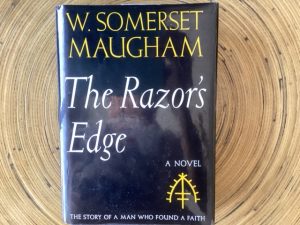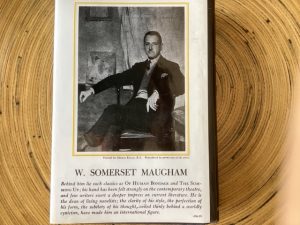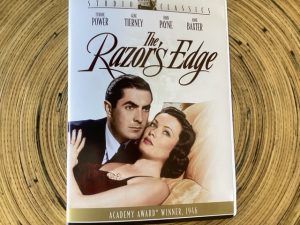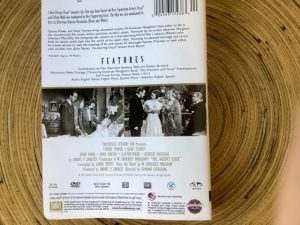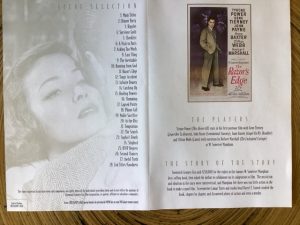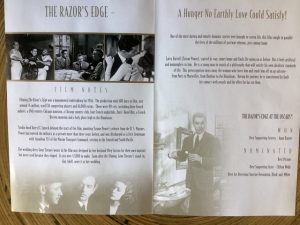(Since my wife and I haven’t been inside a theatre since the 2000s.)
This year we’ll be re-watching arguably the best, most popular film adaptation of a W. Somerset Maugham novel.
The Razor’s Edge
“The fact that a good many people believe something is no guarantee of its truth.”
“You see, money to you means freedom; to me, it means bondage.”
Always interesting to come back to for a glimpse of Larry, the central character, who pursues a life-long quest for higher, unconventional meaning and purpose. Too, the various other limited characters–the shallow, conventional Isabel who can’t control Larry and who marries for money; Elliott, her snob-uncle, whose surface/appearance-oriented shallowness is repeatedly and humorously emphasized; Sophie–a decent woman who tragically loses her husband and child and then slips into alcohol and opium addiction and promiscuity; the limited, rich, but then poorer Gray who at least appreciates the second chance Larry gives him after the former’s breakdown; and even the Maugham-narrator who, though a writer, an accurate social observer, and fan of Larry’s, nonetheless, lacks his passion and active life-engagement.
……………………………………………
Larry Explains Himself:
“I wish I could make you see how much fuller the life I offer you is than anything you have a conception of. I wish I could make you see how exciting the life of the spirit is and how rich in experience. It’s illimitable. It’s such a happy life. There’s only one thing like it, when you’re up in a plane by yourself, high, high, and only infinity surrounds you. You’re intoxicated by the boundless space. You feel such a sense of exhilaration that you wouldn’t exchange it for all the power and glory of the world.”
–To Isabel, his disappointed, conventional, rejected fiancé in the novel The Razor’s Edge
……………………………………………..
Ultimately, the book is about a reflective do-good outsider, who is far more interesting and morally finer than the limited materialists and socialites with whom he starts out with in Chicago, notably the scheming Isabel who loses him forever after he confronts her with responsibility for Sophie’s death. Given the fate of Sophie, the childish nastiness of Isabel, the simplicity of Gray, and the limitations of the Maugham-narrator, Maugham suggests that life can be unfair, tragic, hypocritical, deceptive, misfocused on making money, limited, and limiting except for those with consciousness and awareness (like the narrator) and for those with more moral purity and idealism (like Larry).
……………………………………………….
The famous 1940s film version is, incidentally, a good adaptation and well-acted with Tyrone Power as Larry and Herbert Marshall as Maugham. Anne Bancroft won a Best Supporting Actress Academy Award for her role as a likable, yet pathetic Sophie.
……………………
(after AA evening re-viewing:
Well, of course, it was 1946, just after WW II, and producer Zanuck would have insisted on playing up the romance, melodrama (in Paris), and variety of interesting women characters in Larry’s life. BTW/ Power and Gene Tierney were absolutely gorgeous stars to look at and his scenes were always special because of his projected charisma and the fact that Larry is the centre and protagonist of this very crowded narrative. He was very convincing, charismatic, and sincere in his thoughtful speeches and aspirations. In my mind, he is/was Larry, essentially.
“I only wanted to suggest to you that self-sacrifice is a passion so overwhelming that beside it even lust and hunger are trifling.”
“I happen to think we’ve set our ideal on the wrong objects; I happen to think that the greatest ideal man can set before himself is self-perfection.”

